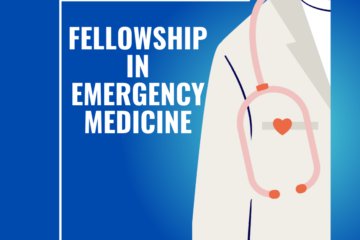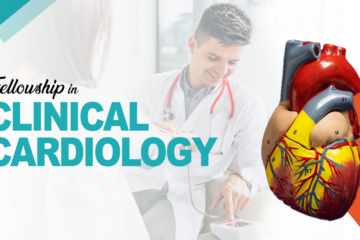
Critical Care Medicine (CCM) is a crucial specialty dedicated to diagnosing and managing life-threatening conditions that require advanced organ support and invasive monitoring. In India, the significance of this field has grown rapidly, especially in response to the increasing incidents of severe infections, trauma, and chronic diseases. To meet the demand for highly skilled professionals in this area, numerous fellowship in Critical Care Medicine have been established across the nation.
Critical Care Medicine focuses on the management and treatment of patients with life-threatening illnesses and injuries, primarily in intensive care units (ICUs). These units are equipped with advanced medical technology and staffed by highly trained healthcare professionals who provide round-the-clock care to stabilize and support patients through acute phases of illness or injury.
Importance of Critical Care Medicine in India
India faces unique healthcare challenges due to its large population, diverse healthcare infrastructure, and a rising burden of both communicable and non-communicable diseases. Critical care medicine plays a pivotal role in addressing these challenges by ensuring timely and specialized treatment for patients with life-threatening conditions. This specialty is crucial not only in tertiary care hospitals but also in smaller healthcare facilities striving to enhance their critical care capabilities.
Why Pursue a Fellowship in Critical Care Medicine?
- Specialized Training: Fellowship programs offer in-depth training in managing critically ill patients, focusing on advanced life support techniques, invasive procedures, and the use of modern diagnostic and therapeutic technologies.
- Career Advancement: A fellowship in CCM enhances career prospects, opening doors to roles in leading hospitals, academic institutions, and research organizations.
- Impactful Work: Critical care specialists play a crucial role in saving lives and improving patient outcomes, providing a sense of fulfillment and professional satisfaction.
Understanding Cardiovascular Emergencies in Critical Care
Cardiovascular emergencies are life-threatening conditions requiring immediate medical attention to prevent significant morbidity and mortality. These emergencies encompass a range of acute disorders that affect the heart and blood vessels, including acute coronary syndromes, arrhythmias, heart failure, and cardiogenic shock. Understanding the signs, symptoms, and appropriate responses to these conditions can be critical for healthcare professionals and the general public.
Acute Coronary Syndrome (ACS)
Acute Coronary Syndromes encompass conditions such as myocardial infarction (heart attack) and unstable angina. These conditions occur due to a sudden reduction in blood flow to the heart muscle, often caused by the rupture of atherosclerotic plaques in the coronary arteries.
Signs and Symptoms:
- Chest pain or discomfort, often described as pressure, squeezing, or fullness in the chest
- Experiencing pain that spreads from one part of the body to another—such as from the jaw, neck, back, shoulder, or arm
- Shortness of breath
- Nausea, vomiting, and dizziness
- Sweating
Immediate Response:
- Call emergency services immediately.
- Administer aspirin if available, unless contraindicated.
- If trained, perform CPR if the person is unresponsive and not breathing normally.
Arrhythmias
Arrhythmias are abnormal heart rhythms that can be too fast, slow, or irregular. Some arrhythmias, like ventricular fibrillation, can be life-threatening and require immediate intervention.
Signs and Symptoms:
- Palpitations (feeling of a rapid or irregular heartbeat)
- Dizziness or lightheadedness
- Shortness of breath
- Chest pain
- Sudden loss of consciousness
Immediate Response:
- Call emergency services.
- Use an automated external defibrillator (AED) if available and the person is unconscious and not breathing.
- Perform CPR if necessary and trained to do so.
Heart Failure
Heart failure occurs when the heart is unable to effectively pump an adequate amount of blood to meet the body’s requirements. Acute heart failure can develop suddenly and may be triggered by a heart attack, severe arrhythmias, or other conditions.
Signs and Symptoms:
- Severe shortness of breath
- Rapid or irregular heartbeat
- Swelling in the legs, ankles, or feet
- Fatigue and weakness
- Coughing up pink, frothy mucus
Immediate Response:
- Call emergency services.
- Keep the person calm and seated upright.
- Administer oxygen if available and the person is trained to use it.
Cardiogenic Shock
Cardiogenic shock occurs when the heart abruptly fails to pump enough blood to meet the body’s requirements, frequently triggered by a severe heart attack. This leads to a drastic drop in blood pressure and inadequate blood flow to vital organs.
Signs and Symptoms:
- Rapid breathing and severe shortness of breath
- Sudden, severe drop in blood pressure
- Weak pulse and cold, clammy skin
- Confusion or altered mental status
- Chest pain
Immediate Response:
- Call emergency services.
- Lay the person down and elevate their legs to improve blood flow to the heart.
- Administer oxygen if available and the person is trained to use it.
- Prepare for possible CPR if the person’s condition worsens.
Preventing Cardiovascular Emergencies
While not all cardiovascular emergencies can be prevented, several measures can significantly reduce the risk:
- Healthy Lifestyle: Maintain a balanced diet, exercise regularly, avoid smoking, and limit alcohol intake.
- Regular Check-ups: Regular medical check-ups can help identify and manage risk factors such as hypertension, diabetes, and high cholesterol.
- Medications: Adherence to prescribed medications for conditions like hypertension, diabetes, and heart disease is crucial.
- Awareness: Being aware of the signs and symptoms of cardiovascular emergencies and knowing how to respond can save lives.
Challenges and Rewards
- High-Stress Environment: Working in ICUs can be physically and emotionally demanding, with long hours and high-stakes decisions.
- Continuous Learning: The field of Critical Care Medicine is constantly evolving, requiring fellows to stay updated with the latest advancements and protocols.
- Professional Growth: The fellowship equips physicians with the skills and knowledge to handle complex cases, enhancing their professional competence.
- Impact on Patient Lives: The ability to make a significant difference in the lives of critically ill patients is immensely rewarding.
The Fellowship in Critical Care Medicine in India provides an excellent opportunity for physicians to advance their careers, acquire specialized knowledge, and make meaningful contributions to patient care. With the increasing demand for skilled critical care specialists, these fellowship programs play a crucial role in shaping the future of healthcare in the country.
Whether your goal is to work in a busy urban hospital or to contribute to critical care education and research, this fellowship can be a transformative step in your medical career.



0 Comments